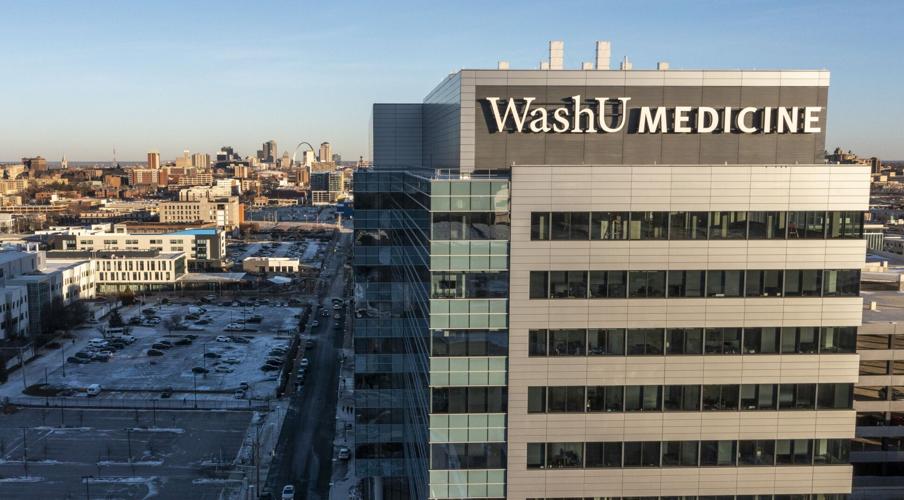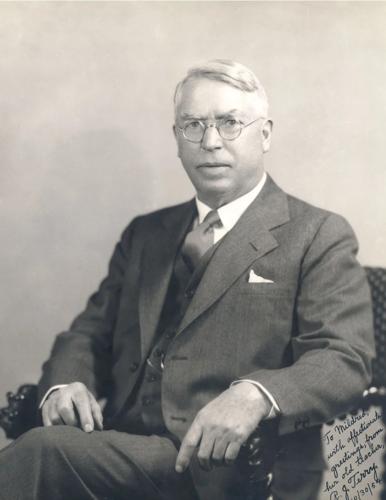
Washington University’s newly built Neuroscience Research Building is seen on the school’s medical campus in the Central West End of �����Ӱ�ԭ�� on Wednesday, Jan. 17, 2024. The 11-story building serves as a hub for research on Alzheimer’s disease, brain tumors, spinal cord injury, psychiatric illnesses and other neurological conditions.
ST. LOUIS — Washington University is distancing itself from a once-revered university leader after students found he had spent years writing about the racial superiority of white people.
WashU has removed the name of Robert J. Terry from all university titles, including a lecture series and professorship at its medical school, after the university’s new Naming Review Board agreed with a challenge co-signed by 12 students.

Robert J. Terry (1871-1966) served as chair of Washington University’s former Department of Anatomy from 1899-1941.
Paul Scott, a recent graduate of WashU, led the charge to remove Terry’s name. He said he first learned of Terry during a lecture on evolution in 2022.
“As a Black student, seeing that someone had done such horrific work in the pursuit of further marginalizing communities like my own was devastating,” Scott said.
The students’ challenge highlighted Terry’s questionable methods of acquiring skeletal remains for his osteology collection — and how that collection informed his now-controversial views.
People are also reading…
Terry served as the head of WashU’s former Anatomy Department from 1899 to 1941. He was a respected figure in �����Ӱ�ԭ�� and the medical world during his lifetime. He died in 1966.
Terry’s trove of bones and preserved human tissue is one of the most widely studied skeletal collections in the world, in the American Journal of Physical Anthropology reported. It’s been used in numerous theses, dissertations, articles and research journals.
But his collection, amassed by leveraging a state law that legalized the dissection of unclaimed bodies, contained specimens taken from over 1,700 deceased individuals who gave no consent for their body parts to be harvested for study.
Terry grew his collection mostly from the cadavers of marginalized people that went unclaimed at public hospitals and morgues in �����Ӱ�ԭ��.
More than half of the specimens came from African Americans, from researcher Carlina de la Cova shows. Others were sourced from poor immigrants in the �����Ӱ�ԭ�� area and the remains of Native Americans. A small portion — at least five males — were Asian.
“He used these bodies to make blasphemous papers,” said Jai-Laan Blackmon, a recent graduate of WashU who also researched Terry.
Blackmon and Scott studied Terry through thousands of pages of letters, papers and studies, and archived materials at WashU.
They found Terry was a staunch supporter of eugenics, a discredited field of study that promoted selective breeding to improve the human race. It promoted certain traits as preferable to others.
Groups considered less “fit” by eugenicists included indigenous populations, Black and Jewish people, and the poor. Eugenics was a key rationalization to sterilize or murder millions of people.
A series of letters written by Terry made clear where he stood on eugenics. In one letter, he complained of the “bad stock” entering the U.S., the review board reported. He wrote “the hereditarily defective and unfit” had become “a menace to the hereditary constitution of our people.”
Terry also served on the advisory council of the International Commission on Eugenics Committee of the U.S.
Scott and Blackmon said they were shocked that WashU, or really anyone in the medical community, did not acknowledge Terry’s past until recently.
“These histories weren’t necessarily communicated,” Scott said. “In fact, Dr. Terry and his legacy were being honored and celebrated.”
The annual Robert J. Terry Lecture was established in 1938 and remained a renowned public address at what’s now the Department of Neuroscience at WashU.
The Robert J. Terry Professorship was established in 2007 and held by a series of eminent researchers. The latest to hold the title was , a leader in neuroscience.
In an email, Kepecs said the Terry professorship was discontinued earlier this year and he supported the board’s decision.
Scott’s submission to remove Terry’s name from the titles was the first brought to the Naming Review Board. The university formed the board in 2024 as a check to ensure the names of buildings, scholarships and other university features
Peter Kastor, a history professor and chair of the board, said the detailed records Terry left behind were key to their decision to remove his name.
“As a historian, it’s often very difficult to understand somebody’s beliefs,” Kastor said. “With Terry, this was not a question. He left a large and copious documentary record, and it’s filled with correspondence in which he expresses his support for the eugenics agenda.”
Scott, who graduated on Monday, said the review board’s decision makes him “just as happy, if not happier,” than receiving his degree.
But the work isn’t done yet.
The large bulk of Terry’s bone collection was moved to the Smithsonian Institution in 1967, but a small portion remains at WashU.
It’s unclear how much.
Two university spokespeople and a member of WashU’s general counsel did not answer questions about how much of the Terry collection remains at the university.
The review board’s report said efforts were underway for the “ethical management” of the collection with community input.
Julie Flory, vice chancellor for marketing and communications, said WashU is reviewing the matter and is looking for a way to honor the individuals involved. She confirmed no remains from the collection are being used in any way.
The identities of the people in Terry’s collection are unknown and have “no recognition to this day,” Blackmon said.
“This story does not end here, and it still has not ended every day that this collection has not been treated in a way that amends these harms,” Blackmon said.
(Note: This video was taped on April 9, 2024). Andrew Martin, chancellor of Washington University, discusses the new Neuroscience Research Building, critical brain research and how attracting top scientists can help �����Ӱ�ԭ��.

















